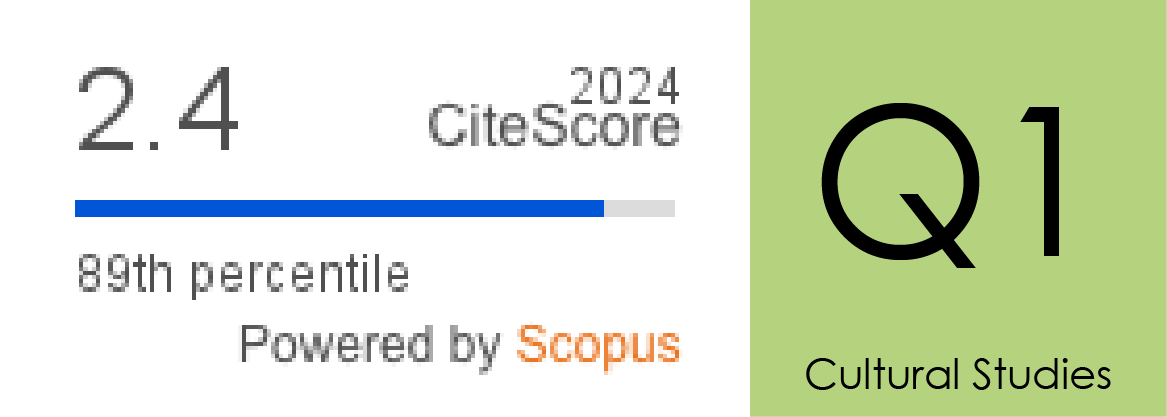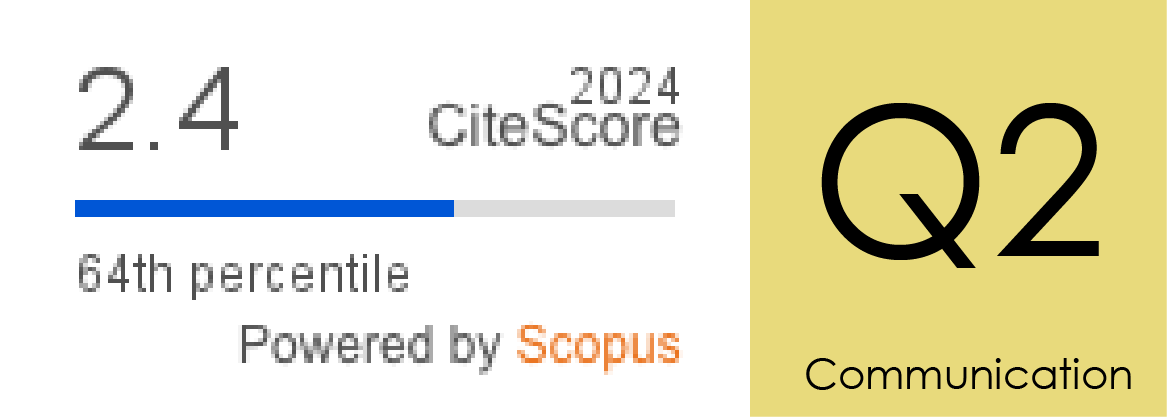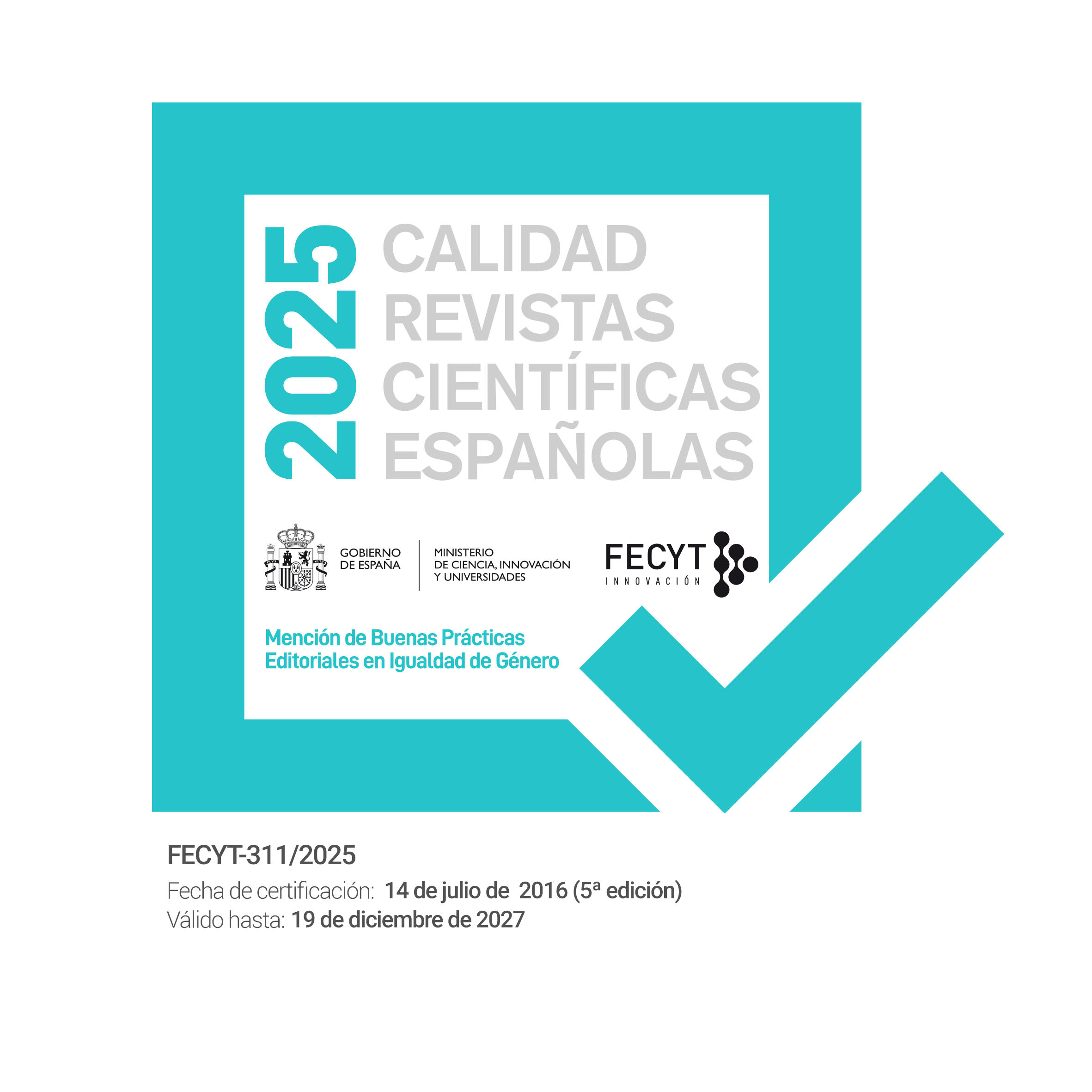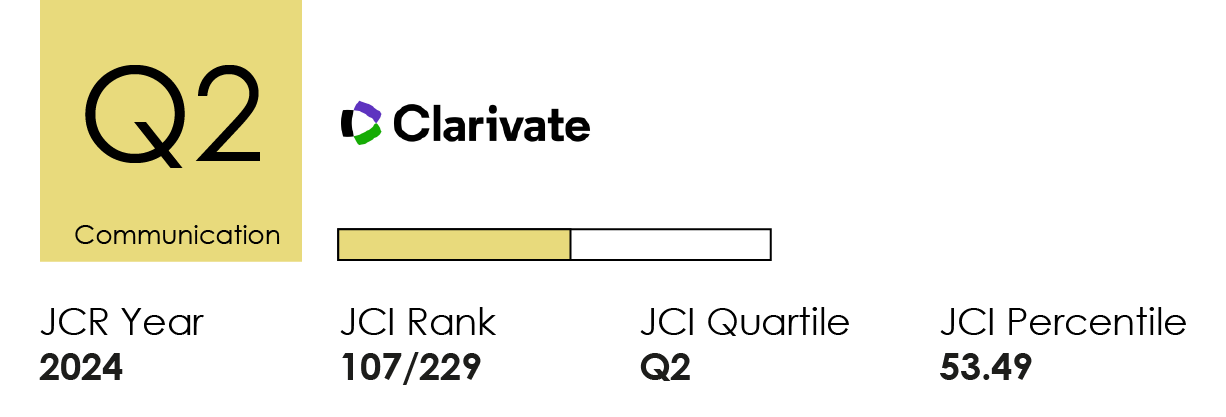Retos online para los jóvenes portugueses e italianos en 2018
DOI:
https://doi.org/10.14198/MEDCOM2019.10.2.3Palabras clave:
Competencias y habilidades informacionales, Contenidos negativos generados por el usuario, Cyberbullying, EU Kids online, Ninõs y Internet, Redes socialesResumen
Derivado de la encuesta EU Kids Online (2018) este artículo analiza dos temas relacionados con la creciente difusión de mensajes de odio y noticias falsas: en primer lugar, cómo los niños y jóvenes italianos y portugueses (9-17) se comportan ante los contenidos y conductas negativas online. En segundo lugar, cómo aprenden a informarse y cómo gestionan las noticias. En comparación con las encuestas anteriores realizadas en Portugal e Italia (EU Kids Online 2010, Net Children Go Mobile, 2014), los resultados evidencian un aumento de experiencias negativas en línea (mensajes de odio, imágenes violentas y sangrientas, ser víctima o perpetrador de acoso cibernético). Aunque esto ocurre con más frecuencia en Portugal, los niños italianos y portugueses presentan patrones relativamente similares de afrontamiento. En ambos, la competencia navegando o buscando información precisa es menor que la competencia tecnológicas o sociales, afectando el género y la edad. Los resultados subrayan la necesidad de empoderar a los niños con valores humanistas y alfabetizaciones críticas, como parte de una cultura de derechos y responsabilidades digitales.
Financiación
Financed by ‘EU Kids Online’ is a thematic network funded by the EC Safer Internet plus Programme (SIP-2005-MD-038229).Citas
Borrowman, S. (1999). Critical surfing: Holocaust, Deniability and Credibility on the Web. College Teaching, 47(2), 44-54. https://doi.org/10.1080/87567559909595782
Couldry, N. (2012). Media, Society, World. Cambridge: Polity Press.
Couldry, N. & Hepp, A. (2017). The Mediated Construction of Reality. London: Polity Press.
Fortunati, L. (2011). Digital native generations and the new media. In F. Colombo & L. Fortunati (Eds.), Broadband Society and Generational Changes (pp. 201-219). NY: Peter Lang.
Haddon, L. & Vincent, J. (2014). European children and their carers’ understanding of use, risks and safety issues relating to convergent mobile media. Milano: Unicatt.
Hasebrink, U. (2014). Children's changing online experiences in a longitudinal perspective. London, LSE: EU Kids Online. Available at https://bit.ly/2ULWf26
Hasebrink, U.; Livingstone, S. & Haddon, L. (2008). Comparing Children's Online Activities and Risks across Europe. A Preliminary Report Comparing Findings for Poland, Portugal and UK. London, LSE: EU Kids Online. Available at https://bit.ly/2TxC2wx
Hepp, A. & Hasebrink, U. (2017). Researching transforming communications in times of deep mediatization: a figurational approach. In A. Hepp; A. Breiter & U. Hasebrink (Eds.), Communicative Figurations. Transforming Communications in Times of Deep Mediatization (pp. 15-47). London: Palgrave.
Helsper, E.; Kalmus, V.; Hasebrink, U.; Sagvi, B. & De Haan, J. (2013). Country Classification: Opportunities, Risks, Harm and Parental Mediation. London, LSE: EU Kids Online. Available at https://bit.ly/2RIC1UJ
Jowett, G. & O'Donnell, V. (1999). Propaganda and Persuasion. Thousand Oaks: Sage.
Keen, E. & Georgescu, M. (2016). Referências. Manual para o combate do discurso de ódio online através da educação para os direitos humanos. Conselho da Europa: Fundação Calouste Gulbenkian. Available at https://bit.ly/2Tuoxhc
Klein, A. (2017). Fanaticism, Racism, and Rage Online. Corrupting the digital sphere. New York: Palgrave Macmillan. https://doi.org/10.1007/978-3-319-51424-6
Livingstone, S.; Haddon, L.; Görzig, A. & Ólafsson, K. (2011). Risks and safety on the internet: the perspective of European children: full findings and policy implications from the EU Kids Online survey of 9-16 year olds and their parents in 25 countries. LSE, London: EU Kids Online. Available at https://bit.ly/2GrF1my
Livingstone, S.; Kirwill, L.; Ponte, C. & Staksrud, E. (2014). In their own words. What bothers children online? European Journal of Communication, 29(3), 271-288. https://doi.org/10.1177/0267323114521045
Livingstone, S.; Mascheroni, G. & Staksrud, E. (2015). Developing a framework for researching children’s online risks and opportunities in Europe. LSE, London: EU Kids Online. Available at https://bit.ly/2WGYdmd
Livingstone, S.; Mascheroni, G. & Staksrud, E. (2018). European research on children’s internet use: Assessing the past and anticipating the future. New Media & Society, 20(3), 1103-1122. https://doi.org/10.1177/1461444816685930
Livingstone, S.; Nandi, A.; Banaji, S. & Stoilova, M. (2017) Young adolescents and digital media: uses, risks and opportunities in low- and middle-income countries: a rapid evidence review. London: GAGE
Mascheroni, G. & Cuman, A. (2014). Net Children Go Mobile: Final report. Deliverables D6.4 & D5.2. Milano: Educatt. Available at https://bit.ly/2DWVkWX
Mascheroni, G. & Ólafsson, K. (2014). Net children go mobile: risks and opportunities. Second edition. Milano: Educatt. Available at http://eprints.lse.ac.uk/56986/
Mascheroni, G. & Ólafsson, K. (2018). Accesso, usi, rischi e opportunità di internet per i ragazzi italiani. I risultati di EU Kids Online 2017. Milano: EU Kids Online e OssCom.
Ponte, C. & Baptista, S. (2018). EU Kids Online Portugal. Usos, competências, riscos e mediações da internet reportados por crianças e jovens (9-17 anos). Lisboa: NOVA FCSH
Ponte, C. & Simões, J. A. (2009). Asking parents about children's internet use: comparing findings about parental mediation in Portugal and other European countries. London, LSE: EU Kids Online.
Simões, J. A.; Ponte, C.; Ferreira, E. & Doretto, J. (2014). Crianças e meios digitais móveis em Portugal. Resultados nacionais do projeto Net Children Go Mobile. Lisboa: CESNOVA, FCSH/NOVA. Available at https://bit.ly/2qR1dxi
Soral, W.; Bilewicz, M. & Winiewski, M. (2018). Exposure to hate speech increases prejudice through desensitization. Aggressive Behavior, 44(2), 136-146. https://doi.org/10.1002/ab.21737
Titley, G. (2014). Hate speech online: considerations for the proposed campaign. In G. Titley; E. Keen & L. Földi (Eds.), Starting points for combating hate speech online (pp. 7-22). Council of Europe, Youth Department
Van Deursen, A.; Helsper, E. J. & Eynon, R. (2014). Measuring Digital Skills. From Digital Skills to Tangible Outcomes project report. Oxford Internet Institute. Available at https://bit.ly/2MTdmfo
Van Deursen, A. & Helsper, E. J. (2015). The Third-Level Digital Divide: Who Benefits Most from Being Online? In L. Robinson; S. Cotton; J. Schulz; T. Hale & A. Williams (Eds), Communication and Information Technologies Annual (Studies in Media and Communications, Volume 10) (pp. 21-52). Bingley: Emerald Group Publishing Limited. https://doi.org/10.1108/S2050-206020150000010002
Vandoninck, S.; d’Haenens, L. & Smahel. D. (2014). Preventive measures – how youngsters avoid online risks. London, LSE: EU Kids Online. Available at https://bit.ly/2GcZA7a
Estadísticas
Publicado
Cómo citar
Número
Sección
Licencia
Derechos de autor 2019 Cristina Ponte

Esta obra está bajo una licencia internacional Creative Commons Atribución-CompartirIgual 4.0.
Los autores y autoras que publican en esta revista están de acuerdo con los siguientes términos:
1 Derechos de autor. Los autores y autoras conservan sus derechos de autor, aunque ceden a la revista de forma no exclusiva los derechos de explotación (reproducción, distribución, comunicación pública y transformación) y garantizan a esta el derecho de primera publicación de su trabajo, el cual estará simultáneamente sujeto a la licencia indicada en punto 2. Los autores pueden establecer otros acuerdos adicionales para la distribución no exclusiva de la versión de la obra publicada en la revista, siempre que exista un reconocimiento de su publicación inicial en esta revista.
© Los autores.
2 Licencia. Los trabajos se publican en la revista sujetos a la licencia de Reconocimiento 4.0 Internacional de Creative Commons (CC BY 4.0); los términos se pueden consultar en https://creativecommons.org/licenses/by/4.0/
Esta licencia permite a terceros compartir (copiar y redistribuir el material en cualquier medio o formato) y adaptar (remezclar, transformar y crear a partir del material para cualquier finalidad, incluso comercial), siempre que se reconozca la autoría y la primera publicación en esta revista (Revista Mediterránea de Comunicación (RMC) / Mediterranean Journal of Communication (MJC), Universidad de Alicante, DOI de la obra), se proporcione un enlace a la licencia y se indique si se han realizado cambios en la obra.
3 Política de autoarchivo. Se recomienda a los autores que difundan sus trabajos a través de Internet para favorecer una circulación y difusión más rápidas y, con ello, un posible aumento en la citación y alcance entre la comunidad científica y académica, en las siguientes condiciones:
No se permite a los autores depositar en un repositorio institucional o temático, página web propia, etc., las versiones preprint (versión antes de ser evaluada) o postprint (versión evaluada y aceptada para su publicación) de sus trabajos antes de su publicación, pero sí el artículo final publicado (versión del editor).














